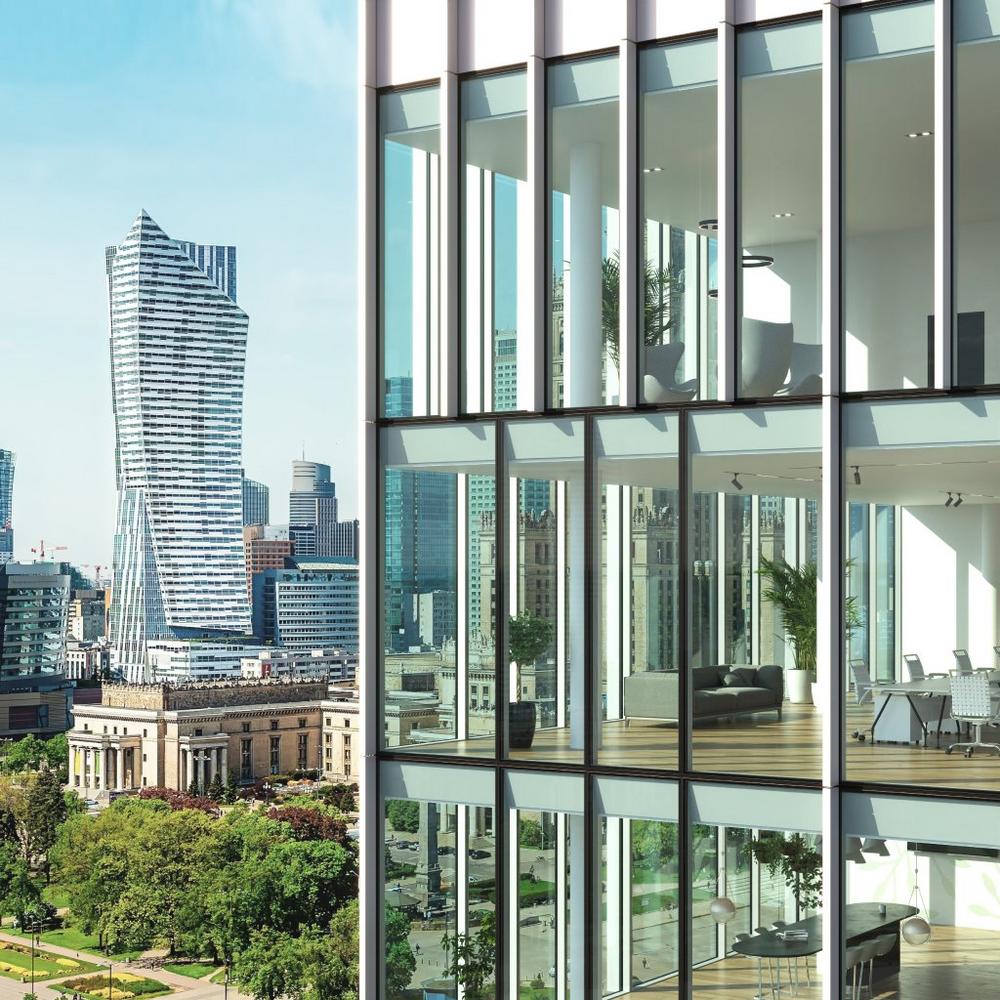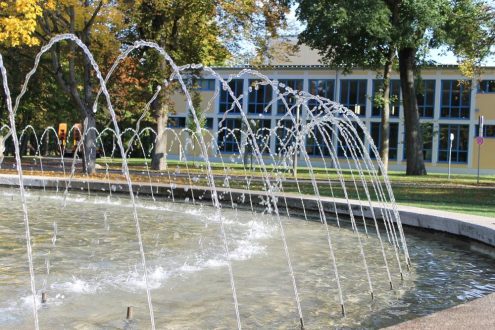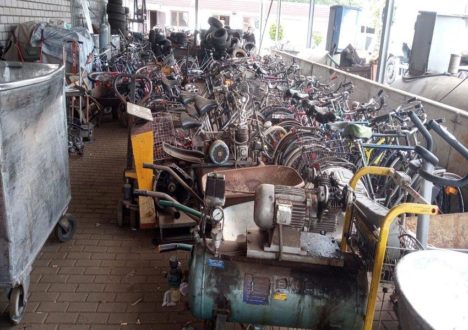
The future of the building envelope
Minimal Wall
With Carbon Control, Schüco provide comprehensive solutions for reducing the carbon footprint of the building envelope. The range is constantly being expanded to take advantage of additional ways to reduce CO2 levels. One possibility, for example, is to optimise the use of materials in the building envelope, which then minimises CO2 emissions in the production process. Narrower profiles with lower basic depths must, however, be able to meet the same requirements in terms of functionality and security. In particular, the safe distribution of the load-bearing capacity is one of the biggest challenges in the development of new façades that use a lower proportion of material.
As a response to this challenge, Schüco has developed the cutting-edge Schüco Minimal Wall unitised façade concept. The Minimal Wall construction concept uses the principles of the bonding behaviour between glass and aluminium but enhances it using an innovative glue technology. The additional load-bearing capacity, which results from structural bonding between the two materials, is considered in order to be able to minimise the structurally load-bearing dimensions of the frame. Minimal Wall glazing can be designed using the standard glass composition. All the additional functions such as spandrel cladding, cantilevered design elements and opaque areas can therefore be integrated without any restrictions.
Overall, the Schüco Minimal Wall can reduce the proportion of aluminium used by up to 40 percent. The pioneering concept can consequently help to reduce the CO2 values of Schüco building envelopes even further.
Schüco FACID NOX
In addition to CO2, other substances are also released into the air during industrial processes. Nitrogen contributes to the pollution of outdoor air. When oil, gas, coal, wood and rubbish are burned, nitrogen oxides are released and contribute to particulate matter in the air. This is considered to be one of the main causes of air pollution, especially in cities. With the FACID NOX façade, Schüco is currently running a pilot project to test a nitrogen-binding textile façade for air purification in city centres. The pilot façade, which measures two times 8 x 20 metres with a total area of around 320 square metres, has been on a building in Cologne city centre since April 2024. The air-purifying façade is visually indistinguishable from a Schüco FACID textile façade, which combines functional design freedom with practical benefits. The façade can be adapted to different supporting surfaces and can be designed in both 2D or 3D geometries. This results in unique designs that can be implemented quickly and cost-effectively, even when the building is in use, thanks to the use of system profiles. The system is therefore ideal for retrofitting in densely built-up cities without having to interfere with the fabric of the building. For the air-purifying effect, an active ingredient is applied to the textile façade which filters out nitrogenous substances that are harmful to both health and the environment, and converts them into harmless nitrates. Rainwater washes the nitrates off the façade and these then enrich the soil as minerals. Scientific studies support the positive result. As an additional advantage, the textile membrane can also be mounted in front of windows. This protects the building from overheating, can significantly reduce the energy consumption used for cooling and reduces CO2 emissions. At the same time, the micro-perforated membranes allow an almost completely unobstructed view to the outside.
The Cologne pilot project, which Schüco is running together with the city of Cologne and the “Lebendige Stadt” foundation, is now using digital measurement technology to measure the air quality in front of and behind the membrane to evaluate and document the performance of the air-purifying filter. The renowned Jülich Research Centre has been commissioned to evaluate the measurement results, which will be collected over the course of approximately one year.
An initial test run of the façade in 2021 on a building in Hamburg already delivered positive results. During a two-month test period, around 30 percent less nitrogen dioxide was measured. The significantly more comprehensive test in Cologne, supervised by an external research institute, is now set to deliver more detailed results.
The AW Circular vision
The AW Circular vision also promotes a ground-breaking direction. AW Circular aims to reduce emissions, waste and the use of resources throughout the entire lifecycle of an aluminium window and at the same time help to close all the resource cycles. By consistently applying the principles of circular design, AW Circular offers a wide range of circular design options intended to optimise material health, reduce the carbon footprint and close resource cycles. The AW Circular solutions have been developed in accordance with the recognised R-strategies, which follow a ten-stage R framework from R0 to R9. The R strategies are central components of the circular economy and support the implementation of its aims. They are sorted according to their degree of circularity: the lower the value, the higher the degree of circularity. As the R9 Recover strategy has the lowest recyclability, it is rarely applied with AW Circular. Overall, the R-strategies help to reduce the consumption of resources and promote the reuse of products, components and materials.
Extending the lifespan of the product and its components, as well as closing the resource cycles, were therefore already taken into account during the design and development process for AW Circular. As a result, the design enables easy maintenance and repair, processing and retrofitting, as well as the reuse of the product or individual components. At the end of the lifespan, almost all the materials in the product can be recycled to a high quality. As circular products also play an important role in the gradual reduction of the carbon footprint, AW Circular also includes a range of CO2-reducing measures. These include a material-efficient design, an increased proportion of recycled materials and the use of second-life components. To meet the highest standards in the choice of materials, Schüco AW Circular has been developed according to the strict Cradle to Cradle Material Health Gold Standard (C2C MH Gold). This means that 100 percent of the materials have been assessed as non-hazardous and recyclable.
AW Circular is still a Schüco vision, but its ongoing development reflects the increasing importance of circularity. Studies show that the circular economy could reduce worldwide emissions by almost half in key industries. This means that lower levels of harmful gases would be released into the atmosphere, which could slow down the rate of global warming. Circular products are therefore an important lever for achieving climate and environmental goals, as they reduce the consumption of resources and extend the lifespan of products, components and materials. In accordance with the revised German Construction Products Regulation, construction products in the European Union should fulfil circular requirements comprehensively in the future. This includes improving resource efficiency, avoiding waste, prioritising repair, reuse and processing, as well as promoting secondary building materials and recyclability. Consequently, the circular economy is continuing to evolve from a concept into a necessary step towards a sustainable future.
Schüco – System solutions for windows, doors and façades
Based in Bielefeld, the Schüco Group develops and sells system solutions made of aluminium, steel and PVC-U for the building envelope. The product portfolio includes window, door, façade, ventilation, security and sun shading systems, as well as intelligent networked solutions for residential and commercial projects. Schüco also provides consultancy and digital solutions for all phases of a building project – from the initial idea through to design, fabrication and installation, as well as after sales with maintenance and servicing. Fabrication machinery and customer-oriented service complement the product portfolio. As one of the leading companies in the construction industry, Schüco is committed to being a pioneer for comprehensive sustainability and to making an active contribution to climate neutrality and the circular economy within the construction sector through its products and services. Founded in 1951, Schüco is now active in more than 80 countries and achieved a turnover of 2.11 billion euros in 2023 with 6750 employees.
For more information, visit www.schueco.com
SCHÜCO International KG
Karolinenstraße 1-15
33609 Bielefeld
Telefon: +49 (521) 78-30
Telefax: +49 (521) 7834-51
http://www.schueco.de
Telefon: +49 5217831174
E-Mail: PR@schueco.com
![]()




